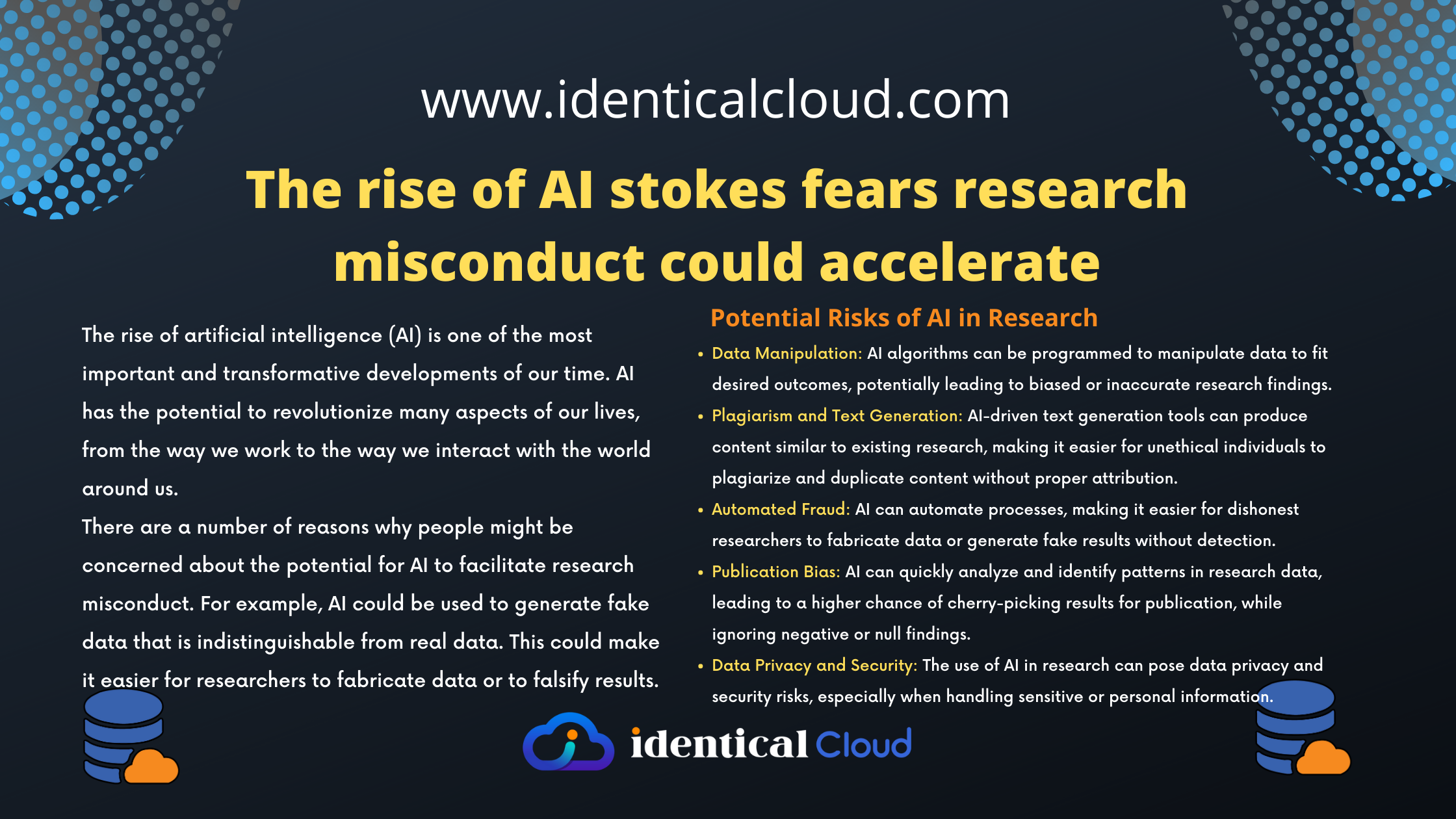
The rise of AI stokes fears research misconduct could accelerate
The rise of AI stokes fears research misconduct could accelerate
The rise of artificial intelligence (AI) is one of the most important and transformative developments of our time. AI has the potential to revolutionize many aspects of our lives, from the way we work to the way we interact with the world around us.
However, there is also a growing concern that AI could be used to facilitate research misconduct. Research misconduct is any action that intentionally or recklessly deviates from accepted practices in research and produces misleading results. This can include fabricating data, falsifying results, or plagiarism.
There are a number of reasons why people might be concerned about the potential for AI to facilitate research misconduct. For example, AI could be used to generate fake data that is indistinguishable from real data. This could make it easier for researchers to fabricate data or to falsify results.
AI could also be used to plagiarize other people’s work. AI can be used to search for and identify patterns in large datasets, which could make it easier for researchers to copy other people’s work without giving them credit.
In addition, there is the risk that AI could be used to manipulate the results of research. AI could be used to select data that supports a particular hypothesis, or to weight data in a way that skews the results.
Of course, there are also those who believe that the benefits of AI outweigh the risks. They argue that AI could be used to improve the quality of research by identifying potential problems with data or by spotting inconsistencies in results.
So, will AI lead to an increase in research misconduct? It is impossible to say for sure. However, it is important to be aware of the potential risks and to take steps to mitigate them. We need to ensure that AI is used for good and not for evil.
However, the swift integration of AI in research also raises ethical concerns. As AI technologies become more prevalent, there is a risk that they might be misused or exploited, leading to research misconduct that could harm the integrity of the scientific community.
Potential Risks of AI in Research
- Data Manipulation: AI algorithms can be programmed to manipulate data to fit desired outcomes, potentially leading to biased or inaccurate research findings.
- Plagiarism and Text Generation: AI-driven text generation tools can produce content similar to existing research, making it easier for unethical individuals to plagiarize and duplicate content without proper attribution.
- Automated Fraud: AI can automate processes, making it easier for dishonest researchers to fabricate data or generate fake results without detection.
- Publication Bias: AI can quickly analyze and identify patterns in research data, leading to a higher chance of cherry-picking results for publication, while ignoring negative or null findings.
- Data Privacy and Security: The use of AI in research can pose data privacy and security risks, especially when handling sensitive or personal information.
Addressing AI-Driven Research Misconduct
To mitigate the risks associated with the rise of AI-driven research misconduct, several steps can be taken:
- Transparency and Reproducibility: Researchers should be transparent about their AI methods and share their code and datasets openly to facilitate reproducibility and peer review.
- Ethics Training: Institutions should provide rigorous ethics training to researchers, emphasizing the responsible use of AI and adherence to research integrity principles.
- Peer Review and Validation: Encouraging thorough peer review and validation processes can help identify potential misconduct and ensure the credibility of research findings.
- AI Regulation: Policymakers should develop guidelines and regulations specific to AI usage in research to promote responsible practices.
- Data Governance: Robust data governance and privacy measures must be in place to protect the confidentiality and integrity of research data.
Here are some of the steps that can be taken to mitigate the risks of AI-facilitated research misconduct:
- Educating researchers about the risks of AI-facilitated research misconduct. Researchers need to be aware of the potential for AI to be used to facilitate research misconduct. They need to be trained on how to identify and avoid these risks.
- Developing ethical guidelines for the use of AI in research. Ethical guidelines should be developed that outline the responsible use of AI in research. These guidelines should address issues such as the use of AI to generate fake data, to plagiarize other people’s work, or to manipulate the results of research.
- Implementing safeguards to prevent AI-facilitated research misconduct. Safeguards should be implemented to prevent AI-facilitated research misconduct. This could include things like requiring researchers to use open-source software, or to have their work peer-reviewed by other experts.
The future of AI is uncertain, but it is important to be aware of the potential risks and benefits. By taking steps to mitigate the risks, we can help to ensure that AI is used for good and not for evil.
